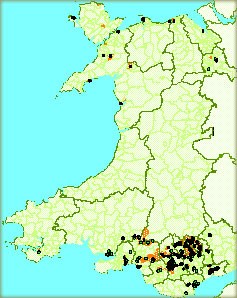United Kingdom - Fissure Sealant Programme for Schoolchildren in Wales
United Kingdom - Fissure Sealant Programme for Schoolchildren in Wales
Introduction
In 2001 health authorities in Wales received approximately 1.5 million pounds for a three-year dental fissure sealant programme targeting the 6-8 year olds from deprived areas. The caries preventative programme was created to address evidence of a marked social gradient associated with caries.
Background and Rationale
Despite a significant fall in dental caries over the last 30 years, caries still poses a significant problem. There is evidence that this is greatest in deprived areas. It has been found that in Wales, 45% of 12 year olds (surveyed in 2004/05) had at least one carious tooth, with a mean DMFT of 2.41 in this group of 6,749 children. Therefore, the project targets the 6-8 year olds during the time when the first permanent molars are erupting. Fissure sealing teeth at this age aims to prevent decay in the permanent dentition.
Due to the socio-economic deprivation link with caries, the programme was first targeted at areas of greatest need, including the 100 electoral divisions with the worst Index of Multiple Deprivation.
Project Outline
Two hundred and fifty six schools were eligible for inclusion in the programme.

Location of schools taking part in the scheme as at October 2004
All children between the age of 6-8 are included for oral health education sessions, which included oral hygiene instruction and dietary advice. Approaches for oral health education used include:
- Free toothbrush packs given every school term.
- Teachers and school helpers received the same training as children.
- Classroom lessons (healthy eating, tooth brushing technique, importance of dental visits).
- Distribution of leaflets, Tooth brushing charts, Worksheets and games focused on healthy foods and hidden sugars.
- When consent has been received from parents, the children are screened by a dentist visiting the school and provided with fissure sealants if indicated. Initially the programme was to be delivered by the Community Dental Service. However, it is possible that in the future general dental practitioners may become involved.
Achievements
The 5 year report from the programme shows positive achievements. Since the programme was started
- 6,804 children between 6 and 8 years old have been assessed in deprived areas of Wales.
- Of these, 57% have had fissure sealants placed with the remaining children not indicated for fissure sealants according to guidelines.
- The number of children assessed has further increased after 5 years, with 1,429 more children assessed in 2008 than 2006.
Conclusion
With dental caries remaining a significant problem, particularly in deprived areas of Wales, the fissure sealing programme has been successful in providing oral health education, toothbrush packs and fissure sealants to 6-8 year olds in Wales.
The programme is resource intensive, with 1,923 teeth sealed per £100,000 in 2008. However, the number of teeth sealed does not exclusively reflect the outcomes of the programme. For example, delivery of the oral health aspect helps improve the working relationship between the Community Dental Service and schools.
References
Morgan M, Treasure E. Fissure sealant programme: health inequalities fund evaluation report. December 2005. Welsh oral health information unit Cardiff University School of Dentistry. (personal communication, Nov 2009)
By Laurence Wood and Sarah Hatherell (Exchange dental students from Cardiff, Wales, UK, Oct - Dec 2009)
